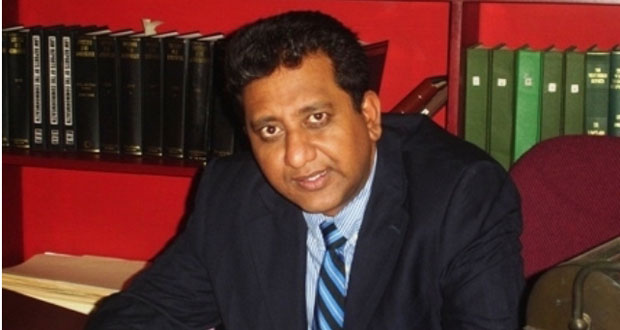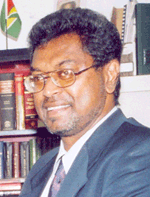Ramjattan’s legal interpretations rejected – AG maintains he made ‘no threat’

Attorney General and Minister of Legal Affairs, Mr. Anil Nandlall
THE contention, as expressed by Alliance For Change (AFC) Leader, Khemraj Ramjattan, that charges can be laid against the Attorney-General (AG) and Minister of Legal Affairs, Anil Nandlall, under the Terrorism Act has been rejected by several legal minds. And the AG himself, in an invited comment, maintains that he did not issue a threat to the publisher of the Kaieteur News or any of its staffers.
“I did not issue a threat; this is another preposterous and reckless statement by Mr. Ramjattan,” Nandlall told the Guyana Chronicle in a telephone interview yesterday.
Ramjattan, in an article in yesterday’s edition of the Kaieteur News, stated that an amendment to the Criminal Law Offences Act has created a new offence of terrorism, and that Section 309 A (a), states: “Whoever with intent to strike terror in any section of the people does any act or thing by using firearms or lethal weapons in such a manner as to cause or likely to cause death or injuries to any person or persons …commits a terrorist act.
“…whoever advocates, aids and abets, advises or incites or knowingly facilitates the commission or, a terrorist act or any act preparatory to a terrorist act commits an offence.”
The AFC Leader’s comments come in the wake of Director of Public Prosecutions (DPP), Ms Shalimar Ali-Hack’s recommendation that no charges be filed against Nandlall, in the controversial private conversation between him and a senior Kaieteur News reporter.
The 19-minute recording of the conversation on October 25 last, between the Attorney-General and Kaieteur News’ Leonard Gildharie, a former schoolmate of the Attorney-General’s, was released days after it was made.
The release was done by publisher of the Kaieteur News, Mr Mohan Lall, also known as Glenn Lall.
He subsequently made a report to Deputy Police Commissioner, Mr. Balram Persaud, premised on the contention that the contents of the recording indicated that his life, the lives of his family and staff members, were under threat.
RECKLESS STATEMENT
According to Nandlall, the AFC is clearly prepared to sacrifice professionalism at the altar of political plays.
“The AFC has demonstrated over the last few years a clear propensity to make bizarre and incredulous public utterances,” Nandlall said, adding:
“One would readily recall the outrageous allegation that Mr. Ramjattan made at a press conference when he disclosed that he has information that the PPP (People’s Progressive Party) was planning to buy-out three Parliamentarians from APNU (A Partnership for National Unity). Both the PPP and APNU expressed their utter shock at his outrageous outburst.
“Indeed, the fact that the no-confidence motion was going to be supported by APNU clearly established that Mr. Ramjattan was simply lying or was, as per usual, reckless.
“One would also recall his charade to the police to report that Dr. Ashni Singh committed an offence by restoring the monies cut from the 2014 Budget when the Constitution clearly authorise the Minister’s action. Most significantly, the very action of Dr. Singh was supported by Mr. Ramjattan and his party in 2012 and 2013.”
The Attorney-General surmised that Ramjattan “knows better” but bemoaned the extent to which the AFC Leader has gone, if only for the sake of scoring political points.
“On the flip side of the coin, I must be a formidable political foe to generate this type of extreme response and to receive so much public attention. For that I am both flattered and humbled,” Nandlall said.
GROUNDS FOR RECOMMENDATION
Ali-Hack, in a statement issued to the media, said that the subject of the investigation was an alleged recording of a private conversation between Nandlall and Gildharie.
As such, based on the evidence contained in the police file, the DPP concluded that the recorded conversation was not between the Attorney General and the publisher of Kaieteur News, Glen Lall, who filed the police complaint against Nandlall.
She noted that Section 141 (a) Chapter 8:02 addresses threatening language with intent to provoke anyone else to commit a breach of the peace, that is provoking another person to do so.
However, the DPP said, “The threatening language must be such as is likely to provoke a breach of the peace by anyone else, that is the person to whom the threat is directed. For the threatening language to result in provocation, the threat must be directly communicated to the person to whom it concerns, that is, in his presence and hearing. There is no evidence of this contained in the police file.”
Ali-Hack added that Section 141 (b) Chapter 8:02 addresses a person use of abusive, insulting, obscene or profane language to the annoyance of another, that is, such language is used directly to the other person in his presence and annoys him.
However, in this case too, she concluded that there is no evidence of this.
“The alleged recording of a telephone conversation between the Attorney General and the Minister of Legal Affairs and Mr. Gildharie does not fall under Section 1a1 (a) or (b) Chapter 8:02,” the DPP said.
As it relates to the circumstances of the communication, Ali-Hack made it clear that the Kaieteur News reporter has not provided any “evidential basis” that can support the institution of criminal proceedings.
Ali-Hack stressed too that she continues to maintain the integrity of the DPP’s Chambers by giving legal advice according to the statements in the police files and the Laws of Guyana, and this is done regardless of race, religion, or political affiliation.
Noteworthy too is the fact that since the matter surfaced, concerns in several sections of society have surfaced over the privacy of confidential personal communications – a matter covered under several international treaties and obligations. Also, Guyana’s Constitution, Article 154 (A) makes it clear that local functionaries in the judicial system, including judges, are required to take into account international law and Guyana’s treaty obligations in their deliberations. Article 154 (A) addresses the protection of human rights.


